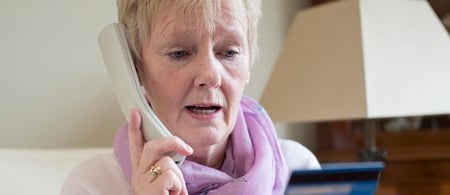
Senior financial abuse is an escalating problem in the US. And while online scammers may be the first threat that comes to mind, the reality is that abusers are often well-known. In fact, according to varying estimates, family members, friends, neighbors and caregivers may account for anywhere between 34 percent and 57.9 percent of perpetrators of financial exploitation of seniors.
Here’s a closer look at the issue, along with tips for keeping your aging loved one safe from financial predators.
Why Seniors Are Susceptible
Between cognitive decline and the accumulation of a lifetime’s worth of wealth, seniors represent a perfect storm of opportunity for predators looking to prey on them. Even worse? It’s likely that senior financial abuse is more prevalent than the figures reveal due to the fact that seniors are less likely to report when they are victimized.
Factor in that seniors are also vulnerable to being targeted by people they know and trust, and the trend is even more alarming. Certified financial planner and financial consultant Beth Lynch told U.S. News & World Report, “You hear it more and more often. It’s people who are close to you, family or friends, someone you know and trust, who take advantage.”
Complicating the issue even further? That the concept of what constitutes financial abuse is not necessarily black and white. Some behaviors are clear-cut, such as taking money without permission; forging signatures; acquiring a signature on a legal or financial document through deceptive measures; and promising care for money without following through.
However, others are murkier. Says psychotherapist Dr. Kathy McCoy, “Kids are not always meaning to be financially abusive, but it can get pretty dire for some parents who will be talked into or will just voluntarily jeopardize themselves by giving too much.”
So how do you know what crosses the line? “It becomes abusive when the adult child requests or demands money without considering the impact this could have on the parent. Some parents want so much to give, they’d give their last dollar to the child. So adult children need to be aware and think before asking,” McCoy continues.
For more information on elder financial abuse, watch this video—and its followup videos—courtesy of mmLearn.
Tips for Preventing Senior Financial Fraud
One of the most important things caregivers can do to help prevent aging loved ones from being taken advantage of is to educate themselves—and to commit to educating seniors, as well. Advises McCoy, “Adult children need to understand how finances change for many people when they are near or are in retirement, and parents need to stop and think about what they can really afford to do to help their kids.”
Having a financial plan in place can also minimize the risk of fraud. By clearly delineating their wishes and the role their financial plan supports that, seniors can be more clearly focused on their own financial needs. Additionally, having a single person who is aware of this plan and/or managing it can lead to disaster. The more people who are aware of this plan, the more effective a system of “checks and balances” develops.
Lastly, caregivers should talk to seniors about money and encourage them to speak up—not just to you, but also to outside professional sources. In fact, according to Safeguarding Our Seniors, a report from Allianz Life Study, older adults who regularly talked to third-party resources about their finances felt better prepared to protect themselves from financial abuse.

Reporting Elder Abuse
These measures aren’t 100 percent foolproof, however. If you suspect that an aging loved one may be a victim of abuse, including financial abuse, the US Department of Justice offers a number of resources aimed at helping seniors and the people who love them to find help and/or report abuse. The Eldercare Locator can also connect you with Adult Protective Services and other local resources designed to protect seniors.
mmLearn.org offers a large library of free videos for caregivers of older adults, covering issues pertaining to senior care, including many elder abuse-related topics. Whether you are a healthcare professional or a family caregiver, if you are caring for an older adult we know that you will find mmLearn.org an essential learning and guidance tool for all of your caregiver training needs. For more online training for caregivers, visit our free online caregiver video library.

